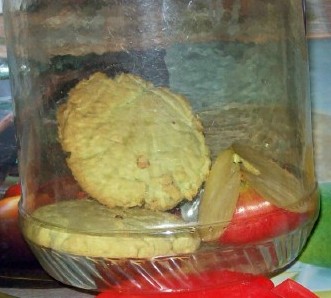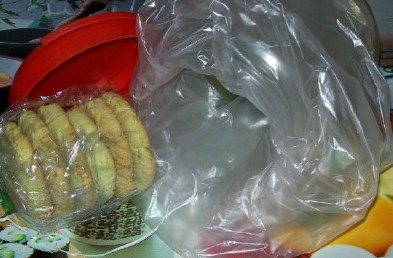Solutions for Your Cookie Problems
“Please add a tab that lists common cookie problems so we can research how to cure them. My problem, cookies turn rock hard after a couple of days in a plastic storage container with tight lid (humid climate).”
| Lynne |
| August 20, 2008 |
Lynne, thank you very much for your thoughtful suggestion! Possible reasons for your homemade cookies to become as hard as rocks during storage are:

- Over-baking
- Over-mixing after adding flour
- Using flour with a high content of protein, i.e. bread flour
- Heating butter instead of letting it softened at room temperature
- Using too much salt
To soften hard homemade cookies, store them in an airtight container along with a piece of fresh apple or bread.
Other cookie lovers/bakers may also have the following common problems.
How can I make my chocolate chip cookies crisp on the outside but soft on the inside?
How does it affect my cookies if I take a shortcut by softening butter in a microwave?
What is the remedy for cookie dough that is too sticky to roll out?
If I keep my cookies in the refrigerator, will they stay fresh longer?
How can I tell if baking powder and baking soda are still good?
What kind of sugar can I use to substitute for confectioners’?
Cookie Problem #1 – The bottom of my cookies tends to burn as the top half just starts to turn lightly brown. How do I prevent my cookies from burning?
Since cookie dough usually contains a large amount of sugar, the bottoms often brown quicker than the rest of the cookies. Thus, to prevent cookies from burning, bake them in the middle or upper third of the oven.
It is also a good idea to use cookie baking sheets that are made of heavy aluminum. Besides conducting heat evenly, heavy-weight baking sheets will not warp or bend after repeated use.
Double panning, stacking two baking or cookie sheets together, is another great way to prevent your homemade cookies from burning on the bottom. If you don’t have two baking sheets to stack together, then line your one and only sheet with good quality aluminum foil.
Finally, make sure that your baking sheet is not too large for the oven. Allow at least an inch of air space between the sides of your baking sheet and oven walls so that heat can adequately circulate around the pan.
Cookie Problem #2 – My ginger molasses cookies rise perfectly during baking, but when I remove them from the oven they flatten out. What am I doing wrong?
You just literally follow the directions and, of course, there is nothing wrong with that. Most cookie recipes call for creaming butter and sugar until light and fluffy. Unfortunately, by the time the mixture is light and fluffy, lots of air cells have already incorporated into it.
These air cells expand as cookies bake causing them to rise, but as soon as they come out of the oven, they will fall flat. So just remember to stop mixing as soon as butter and sugar are thoroughly combined because the purpose of creaming fat and sugar for cookies is more to form a smooth mixture than to beat in air.
In addition, under-baked cookies tend to fall during cooling and, therefore, are flatter.
Cookie problem #3 – How can I make my chocolate chip cookies crisp on the outside but soft on the inside?
You certainly have sophisticated taste buds! Indeed, the best chocolate chip cookies are crisp on the outside but soft on the inside. You can solve this cookie problem by baking your cookie dough in a high temperature oven, between 375 – 400 degrees Fahrenheit.
Cookie Problem #4 – I follow the recipe carefully, but my cookies sometimes spread excessively. What could be the reasons?
The culprit of your cookie problem could be one or a combination of the followings:
- Warm dough – Refrigerate or freeze the formed cookies to make sure that shortening or fat is solid when they go into the hot oven.
- High fat content – Cookies made with butter will spread more than those made with vegetable shortening or margarine.
- High sugar content especially granulated – Reduce the amount of sugar by 2 tablespoons.
- High liquid content, especially from eggs
- Weak flour, one with low protein content
- Over-creaming of butter and sugar
- Greased baking pan
- Low oven temperature – Starch takes longer to absorb moisture, swell up, and form desirable structure. Thus, cookie dough needs to go into an adequately preheated oven to develop proper shape.
- Warm baking sheets – Do allow baking sheets to cool off before adding the next patch of cookie dough.
Cookie problem #5 – How does it affect my cookies if I take a shortcut by softening butter in a microwave?
When you soften butter using a microwave, part of the butter will melt before other parts are soft enough to use. Since melted butter is not very effective in trapping air cells, it tends to yield dense and puff cookies.
If time permitted, unwrap the stick of butter and let it stand at room temperature until it is pliable or just slightly resists a reasonable amount of pressure that you apply to it with your fingers. To speed up softening, cut the butter up into small pieces.
Cookie problem #6 – What is the remedy for cookie dough that is too sticky to roll out?
- Chill dough for one or two hours before rolling. Then cut it into small and manageable pieces. Work with one piece at a time while keeping the others refrigerated.
- Make sure that both your work surface and rolling pin are well-floured. If necessary, add just a tiny bit of flour to dough to make it workable.
Cookie problem #7 – If I keep my cookies in the refrigerator, will they stay fresh longer?
This cookie problem reinforces the myth that refrigeration delays the staling process in baked goods. In fact, your homemade cookies will get soggy and pick up the smell of any other foods stored nearby. They will also get stale more quickly because refrigeration actually expedites starch solidification, the first step of a staling process.
On the other hand, you can store your homemade cookies at room temperature in a covered container for at least a week before they become stale.
Cookie Problem #8 – I like to bake cookies in advance and freeze them for later use. How can I properly pack my cookies for freezing?
First, be absolutely certain that your homemade cookies are completely cool before wrapping them for freezing. This prevents moisture from accumulating and turning them soggy when they defrost.

Secondly, put a few cookies together and wrap them securely in plastic wrap. Place the wrapped cookies in a metal or plastic container and cover tightly to prevent moisture loss, freezer burn, or absorption of unwanted odors in the freezer.
Alternatively, put your freshly baked cookies in a container lined with enough plastic bags to prevent air from sipping in. Seal the bags with a wire tie before covering the container tightly. If your homemade cookies are delicately soft, put wax paper between layers to keep them from sticking together or breaking.
Last but very importantly, use a waterproof marker to note the content and date.
Preparing bar cookies for freezing is as easy as 1-2-3. Here’s how:
- Fit the whole pan in a plastic food storage bag
- Gently press out as much air as you can
- Seal bag with a wire twist tie
You can also just simply cover the baking pan as tightly as you can with aluminum foil.
Well wrapped homemade cookies will retain their freshness for many weeks in the freezer. Remove as many cookies from the freezer as needed and defrost them, wrapped, at room temperature. If cookies lose their crisp crust, freshen and re-crisp thawed cookies in a 300 degree Fahrenheit oven for 3 to 5 minutes.
Serve and enjoy them within 2 days.
Cookie problem #9 – How can I tell if baking powder and baking soda are still good?

Baking Powder – Place a teaspoon of baking powder in a cup of hot water. If the water bubbles, the powder is still active.
Baking Soda – Place a teaspoon of baking soda in a cup of vinegar. If the vinegar foams on the top, the soda is still good.
Cookie problem #10 – What other kind of sugar can substitute for confectioners’?
There is no need for substitution because you can easily make your own confectioners’ sugar.
Combine 1 cup of granulated sugar with 1 tablespoon of cornstarch in a blender. Blend it on medium speed for 2 minutes or until finely ground. You’ve just made your homemade confectioners’ sugar.
Cookie problem #11 – My kids don’t like coconut flakes. What effect does it have on my cookies if I leave it out of the recipe?
This is one of the most common cookie problems and I sympathize with you. I am still trying to get my nieces to eat cookies with any kind of nuts or dried fruits in them.
The answer lies in your selected cookie recipes. If coconut flakes is not an essential ingredient, there may not be any noticeable effect in leaving it out. On the other hand, if the recipe calls for at least ¼ cup of coconut flakes or any undesirable ingredient, then you’d better off selecting another recipe.
I’m committed to helping you bake the best and perfect homemade cookies for your desired taste. Please continue sharing your cookie problems.
References
Cunningham, M. Second Edition. The Fannie Farmer Baking Book. Wings Books, a division of Random House Value Publishing, Inc. Avenel, New Jersey. 1996
Figoni, P. First Edition. How Baking Works – Exploring the Fundamentals of Baking Science. John Wiley & Sons, Inc. Hoboken, New Jersey. 2004
Labensky, Sarah with Eddy van Damme, Priscilla Martel and Klaus Tenbergen. First Edition. On Baking – A Textbook of Baking and Pastry Fundamentals. Pearson Education, Inc., Upper Saddle River, New Jersey. 2005
Raab, Evelyn. First Edition. The Clueless Baker – Baking from Scratch. Firefly Books Inc. Buffalo, NY. 2001.
 260-page eBook packed with delicious cookie recipes
260-page eBook packed with delicious cookie recipes